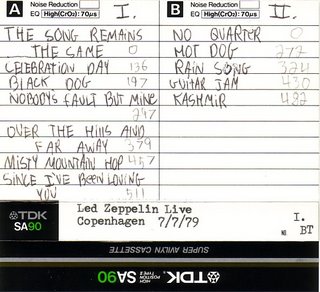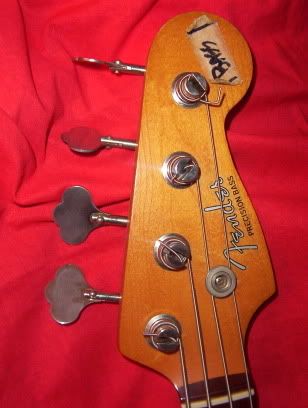Bootlegs

"Bootleggers roll your tapes, this is gonna be a hot one!"
-Bruce Springsteen, onstage at the Roxy, Los Angeles, 1978
Before we delve into this topic, I want to make perfectly clear that I'm talking about bootlegs, not pirate albums. Pirate albums are unauthorized copies of officially released albums that are sold illegally, while bootlegs are recordings whose release (and even creation) were never sanctioned by the artist or their record company, usually concert recordings. Clinton Heylin sums up the difference in his book "Bootleg (the secret history of the other recording industry)"-
"The distinction between bootlegs and pirate albums should be clear-cut: bootlegs are primarily designed to be collectors' items. They are bought by ultra-keen fans, not those looking for a cut-price alternative to (authorized) product"
No one can (in good conscience anyway) defend record pirates, whose work robs artists of royalty money. Bootlegs are different, though. Boots are like archeology- they fill in the gaps in an artist's history. An artist's officially released studio albums only tell part of the story- it is usually left to bootleggers and tape traders to show how those songs sounded in their live incarnations, and document an artist's live performances. Even officially released "live" albums are usually reworked in the studio, with entire vocal performances and guitar tracks replaced (U2's "Rattle And Hum", Thin Lizzy's "Live And Dangerous", The Stones' "Get Yer Ya-Yas Out!" and Aerosmith's "Live Bootleg" are just a few that come to mind). One live album that was not "fixed" was The Who's "Live At Leeds", for my money the greatest live performance of any artist ever recorded. Still, the original album that came out in 1970 contained only 35 minutes worth of a show that ran over two hours. If you wanted to hear the rest, you had to get the bootleg (at least until 2001, when the complete "Leeds" was finally issued, 31 years after the fact).
Here's another example- I'm a big fan of The Byrds, but from a production standpoint, their post "Sweetheart Of The Rodeo" albums are all pretty poor. There are some great songs and killer musicians on those records, but you'd be hard pressed to tell by hearing them. The first part of this clip is the studio version of "Old Blue" from their 1969 album "Dr. Byrds And Mr. Hyde", the second part is a live version recorded a couple weeks after the album was released. The studio version sounds emasculated, with Clarence White's stinging guitar and Gene Parsons' walloping drums bleached into the background- those elements are in full evidence on the live version. McGuinn's vocal on the studio take is subdued to the point of narcolepsy, while the live recording shows him in command of the song-
Old Blue.mp3
Unreleased studio recordings are fair game for bootleggers as well- the first bootleg of the rock era was 1969's "Great White Wonder", a two-record Bob Dylan collection of early demos and selections from the famous (and then unreleased) "Basement Tapes". REM had an entire album worth of songs that they'd discarded before they ever made a "real" record, but those songs are preserved in demo (and live) form via bootlegs. Record companies whine about losing revenue to bootleggers, but seriously- don't you think anyone who'd buy a record consisting entirely of work-in-progress mixes of "Strawberry Fields Forever" probably owns all the legal Beatles albums already?
The first bootleg I ever bought was Led Zeppelin live in Copenhagen, 1979*. It was in 1986 from a record store in Portland, Maine called "The End Of The Rainbow" which had a rack tucked in back with about 100-200 cassettes, which the owner had dubbed from his vast collection of vinyl boots (this was the '80s- all bootlegs were produced on vinyl back then). At first I didn't know what they were, but in scanning the neatly typed cassette spines I quickly realized I'd stumbled onto the mother lode of live concert tapes. "Copenhagen" came on a TDK SA90 and an SA60 (the TDK SA series were the high end tapes of choice in the '80s), and cost me $15. It was an audience recording, decent sounding at best, but it was my first glimpse into the world of bootlegs- unedited, unsanitized, presented exactly as they'd been performed onstage.
The bootleg industry was completely different in those days. Due to the inherent risks of selling unauthorized records it was rare to find stores that stocked them, so your best bet was record collector conventions and record fairs. You'd troll the isles, looking for the code word "imports" on a sign. You usually couldn't listen to what you were buying either, so it was a crap shoot. I've gotten extremely lucky (A TMQ copy of The Who at the Fillmore East '68) and, well, not so lucky (Pink Floyd Montreal '87- that one taught me the best record covers usually hid the worst sounding recordings). Cassette dubs were sometimes available cheaper, and with the advent of the jambox and walkman, you could actually listen to them before buying. Though they were a necessity, cassettes were looked down on in the bootleg community, and rightfully so. Vinyl was still the hi-fi medium for serious listening, and bootleg purchasers were serious music fans.
Once independent CD pressing plants started appearing in the mid '90s, so did CD bootlegs. This represented a major shift from the vinyl/cassette era. Before CDs, if you wanted to make a production quality copy of a bootleg record, you needed to have the source tapes, or to copy the stamper at the pressing plant (and even THAT was tricky to do correctly). Now, any CD could be used as a master copy for replication. If record companies were freaked out by the possibility of lossless copies of bootlegs endlessly circulating the globe, they were about to be truly unnerved- enter the internet.
Today, you can find thousands of excellent quality copies of live performances and studio outtakes on the web, all free for the downloading. By taking the money out of the equation the emphasis is now squarely where it belongs- on the music. People trade recordings online not for profit, but out of genuine love for music and the desire to hear something new and different from their favorite artists. As I type, there's a guy online sharing a truly enormous amount of complete (or near complete) shows from Led Zeppelin's 1973 tour. It's a labor of love, and bands should be flattered that anyone loves their music so much that they're willing to invest the time and effort into preserving 33 year old concert tapes. Record executives take note- will anyone even remember Jessica Simpson's name 33 years from now?
A lot of modern bands get this, and have at least a "hands off" attitude towards concert taping, so long as no money changes hands. There are currently 181 Drive-By Truckers shows on the Live Music Archive and the band don't seem to be seeing any lost revenue, even with a live concert DVD of their own for sale.
Some of my favorite boots-
Billy Bragg- Jayvaskyala, Finland 12/11/84
The Byrds- Boston Tea Party 2/2/69
Led Zeppelin- Danish TV 3/17/69 (officially released on DVD in 2003)
Pink Floyd- Oakland CA 5/9/77
REM- Tyrone's, Athens GA 1/10/81
REM- Larry's Hideaway, Toronto ON 7/9/83
U2- National Stadium, Dublin 2/26/80
The Who- Complete Live At Leeds, 2/14/70 (officially issued in 2001)
*I know I alluded to this one in the "favorite band" post, and said I got it from a friend's brother- I'd forgotten Copenhagen was the one I bought. Sorry for the continuity gaffe.

